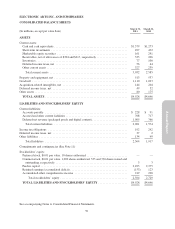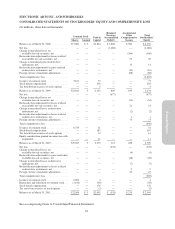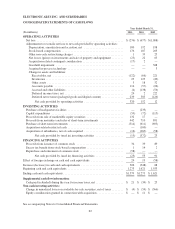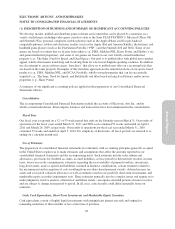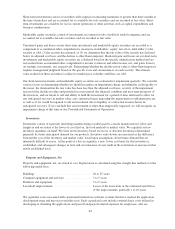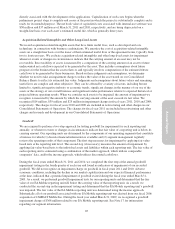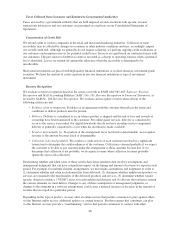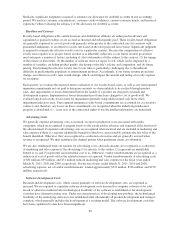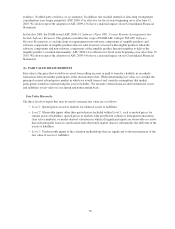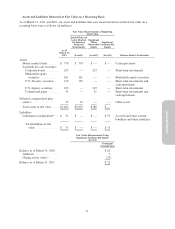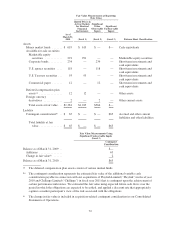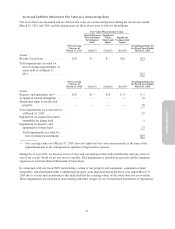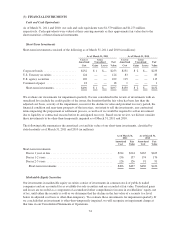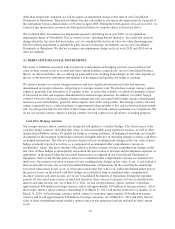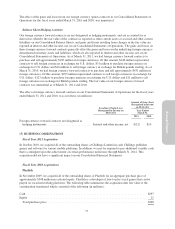Electronic Arts 2011 Annual Report Download - page 143
Download and view the complete annual report
Please find page 143 of the 2011 Electronic Arts annual report below. You can navigate through the pages in the report by either clicking on the pages listed below, or by using the keyword search tool below to find specific information within the annual report.
Annual Report
consumers to play against each other online. In those situations where we do not require an additional fee for this
online service, we account for the sale of the software product and the online service as a “bundled” sale, or
multiple element arrangement, in which we sell both the software product and the online service for one
combined price. We defer net revenue from sales of these games for which we do not have VSOE for the online
service that we provided in connection with the sale, and recognize the revenue from these games over the
estimated online service period, which is generally estimated to be six months beginning in the month after
shipment. In addition, for some software products we also provide updates or additional content (“digital
content”) to be delivered via the Internet that can be used with the original software product. In many cases we
separately sell digital content for an additional fee; however, some purchased digital content can only be
accessed via the Internet (i.e., the consumer never takes possession of the digital content). We account for online
transactions in which the consumer does not take possession of the digital content as a service transaction and,
accordingly, we recognize the associated revenue over the estimated service period. In other transactions, at the
date we sell the software product we have an obligation to provide incremental unspecified digital content in the
future without an additional fee. In these cases, we account for the sale of the software product as a multiple
element arrangement and recognize the revenue on a straight-line basis over the estimated period of game play.
Determining whether a transaction constitutes an online service transaction or a digital content download of a
product requires judgment and can be difficult. The accounting for these transactions is significantly different.
Revenue from product downloads is generally recognized when the download is made available (assuming all
other recognition criteria are met). Revenue from an online game service is recognized as the service is rendered.
If the service period is not defined, we recognize the revenue over the estimated service period. Determining the
estimated service period is inherently subjective and is subject to regular revision based on historical online
usage. In addition, determining whether we have an implicit obligation to provide incremental unspecified future
digital content without an additional fee can be difficult.
Product Revenue. Product revenue, including sales to resellers and distributors (“channel partners”), is
recognized when the above criteria are met. We reduce product revenue for estimated future returns, price
protection, and other offerings, which may occur with our customers and channel partners.
Shipping and Handling. We recognize amounts billed to customers for shipping and handling as revenue.
Additionally, shipping and handling costs incurred by us are included in cost of goods sold.
Online Subscription Revenue. Online subscription revenue is derived principally from subscription revenue
collected from customers for online play related to our massively multiplayer online games and Pogo-branded
online games services. These customers generally pay on an annual basis or a month-to-month basis and prepaid
subscription revenue is recognized ratably over the period for which the services are provided.
Software Licenses. We license software rights to manufacturers of products in related industries (for example,
makers of personal computers or computer accessories) to include certain of our products with the
manufacturer’s product, or offer our products to consumers who have purchased the manufacturer’s product. We
call these combined products “OEM bundles.” These OEM bundles generally require the customer to pay us an
upfront nonrefundable fee, which represents the guaranteed minimum royalty amount. Revenue is generally
recognized upon delivery of the product master or the first copy. Per-copy royalties on sales that exceed the
minimum guarantee are recognized as earned.
Sales Returns and Allowances and Bad Debt Reserves
We estimate potential future product returns, price protection and stock-balancing programs related to product
revenue. When evaluating the adequacy of sales returns and price protection allowances, we analyze historical
returns, current sell-through of distributor and retailer inventory of our software products, current trends in retail
and the video game industry, changes in customer demand and acceptance of our software products and other
related factors. In addition, we monitor the volume of sales to our channel partners and their inventories, as
substantial overstocking in the distribution channel could result in high returns or higher price protection costs in
subsequent periods.
67




